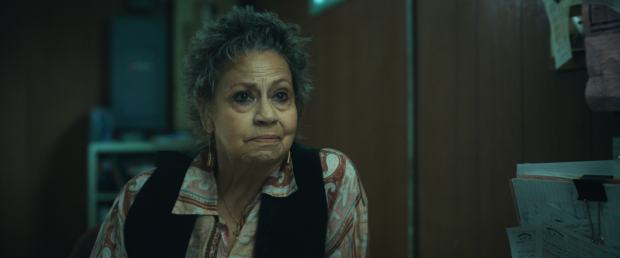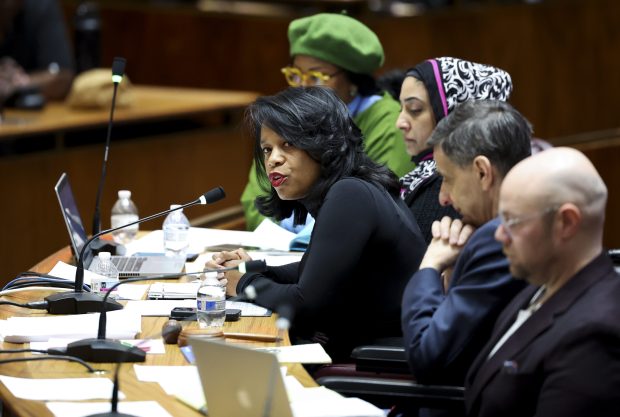The pristine exteriors of affluent suburbs can belie an uglier truth behind closed doors. John Cheever built a career examining the dissatisfaction coursing beneath the surface in these manicured enclaves, and I’m sure Apple is hoping the Jon Hamm series “You Friends & Neighbors” brings something similar to mind, even if it comes with considerably less insight.
Hamm plays Andrew Cooper — Coop to everyone who knows him — a recently divorced New York hedge fund manager living in the ‘burbs where he once shared a much larger house with his wife (Amanda Peet) and two teenage children. The fictional Westmont Village (somewhere in Connecticut maybe?) is filled with “seven and eight-figure homes, rolling lawns and exclusive clubs,” but the marriages and personal finances of its residents are riddled with cracks, even if everyone pretends otherwise. When Coop is fired and unable to get another job, the loss of his steady, ostentatious income functions as a wake-up call, revealing the lies undergirding this lifestyle.
To maintain the illusion that he’s still a master of the universe like his friends and neighbors, he starts burgling their homes. A roll of cash to start. Then designer watches, and so on. But he needs someone to move these hot items and a sketchy pawn shop will have to do. Problem is, he didn’t think to also steal the papers authenticating those watches, so he gets a lowball offer. When he counters, the unflappable pawn shop owner (Randy Danson) sizes him up:
“We don’t get men like you in here very often,” she says evenly. “You’re, what, a trader? A stockbroker? Whatever. The point is you’re a man who buys and sells things he never touches.” But now he’s trying to offload something tangible and his usual bluster and swagger are useless. “You don’t understand this market, but you still think you can negotiate it. That’s not savvy,” she tells him, “that’s stupidity.” It’s a great monologue — both as written and Danson’s delivery, which is perfectly judged.
Soon enough, Coop is in over his head. That’s one narrative thread.
The suburban ennui is the other. The women are thin, beautifully preserved and, despite their material abundance, secretly miserable. So are the men. “Out here, scotch was like a religion,” Coop muses to himself, as he looks around at his male companions. “These houses, these wives, these jobs, this would be the sum total of their lives. Their futures were already written. And so the quest to stave off the emptiness began. Scotch. Cigars. Smoked meats. Custom golf clubs. High-end escorts. Entire industries built to cash in on the quiet desperation of rich middle-aged men.”
They have so much and yet so little. If only that duality were interesting.
It’s a world where consequences don’t really exist if you have enough money. Parents are permissive and checked out, but obsessed about their kids’ futures. They’re good people underneath it all, which is facile and my main beef with the series. What these people are is human — neither especially good nor sympathetic — but human nevertheless.
Coop’s marriage ended after he caught his wife cheating with a retired NBA champ (Mark Tallman) who was part of their social circle, and it wasn’t just a one-off; she’s now dating the guy, and quite happily by all outward appearances. At least that’s what Coop sourly assumes.
As a show, “Your Friends & Neighbors” suggests the rich are disconnected from everything because that’s just what happens when you reach this tax bracket, as if everyone were a passive participant in their lives rather than people making conscious choices. Peet is playing a likable woman who was neglected in her marriage and sought attention elsewhere. And yet she’s still unmoored; this new chapter isn’t all it’s cracked up to be. But she isn’t thinking about how all this massive wealth has left her feeling so empty, and is turning her children into deadeye, alienated creatures.
With his newfound cynicism, Coop is meant to be the realist of the bunch. But the pawn shop owner nailed who he is from the start, because his thefty activities aren’t any different — not spiritually, anyway — from his legitimate ventures at the hedge fund, where the goal is maximizing wealth for the already wealthy, no matter who suffers. Coop has just picked more deserving targets this time. It’s too bad the series (which has already been renewed for another season) isn’t interested in sorting through those parallels more deeply.
But the show’s creator, Jonathan Tropper, has done something interesting with his star. There’s a frisson of recognition that happens when you put Hamm in a role like this. Coop is a latter day Don Draper, but instead of fleeing the suburbs after his divorce, he stayed put and started to burgle his neighbors.
With the lie of the suburban idyll exposed, aren’t guys like this — who drive Maseratis and think the world belongs to them — moving into overpriced bachelor pads in the city for a midlife crisis and some messy sowing of oats?
I know someone who grew up in a suburb like this so I asked, and the answer surprised me: Actually, these men are likely to remain, even if they don’t have joint custody of the kids. The suburbs are what they know. It’s where they’re comfortable. To leave means starting over in ways far more disruptive than sticking around and — chances are — marrying a fellow wealthy suburbanite.
“Your Friends & Neighbors” — 2.5 stars (out of 4)
Where to watch: Apple TV+
Nina Metz is a Tribune critic.




